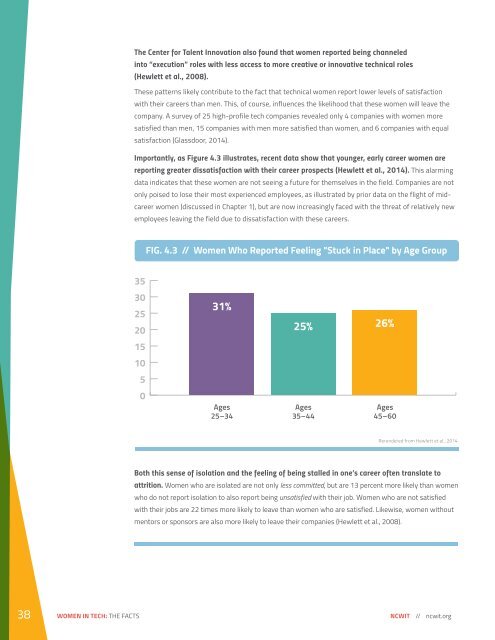WOMEN IN TECH THE FACTS
womenintech_facts_fullreport_05132016
womenintech_facts_fullreport_05132016
You also want an ePaper? Increase the reach of your titles
YUMPU automatically turns print PDFs into web optimized ePapers that Google loves.
The Center for Talent Innovation also found that women reported being channeled<br />
into “execution” roles with less access to more creative or innovative technical roles<br />
(Hewlett et al., 2008).<br />
These patterns likely contribute to the fact that technical women report lower levels of satisfaction<br />
with their careers than men. This, of course, influences the likelihood that these women will leave the<br />
company. A survey of 25 high-profile tech companies revealed only 4 companies with women more<br />
satisfied than men, 15 companies with men more satisfied than women, and 6 companies with equal<br />
satisfaction (Glassdoor, 2014).<br />
Importantly, as Figure 4.3 illustrates, recent data show that younger, early career women are<br />
reporting greater dissatisfaction with their career prospects (Hewlett et al., 2014). This alarming<br />
data indicates that these women are not seeing a future for themselves in the field. Companies are not<br />
only poised to lose their most experienced employees, as illustrated by prior data on the flight of midcareer<br />
women (discussed in Chapter 1), but are now increasingly faced with the threat of relatively new<br />
employees leaving the field due to dissatisfaction with these careers.<br />
FIG. 4.3 // Women Who Reported Feeling "Stuck in Place" by Age Group<br />
35<br />
30<br />
25<br />
20<br />
15<br />
10<br />
5<br />
0<br />
31%<br />
Ages<br />
25–34<br />
25% 26%<br />
Ages<br />
35–44<br />
Ages<br />
45–60<br />
Rerendered from Hewlett et al., 2014<br />
Both this sense of isolation and the feeling of being stalled in one’s career often translate to<br />
attrition. Women who are isolated are not only less committed, but are 13 percent more likely than women<br />
who do not report isolation to also report being unsatisfied with their job. Women who are not satisfied<br />
with their jobs are 22 times more likely to leave than women who are satisfied. Likewise, women without<br />
mentors or sponsors are also more likely to leave their companies (Hewlett et al., 2008).<br />
38 <strong>WOMEN</strong> <strong>IN</strong> <strong>TECH</strong>: <strong>THE</strong> <strong>FACTS</strong> NCWIT // ncwit.org


